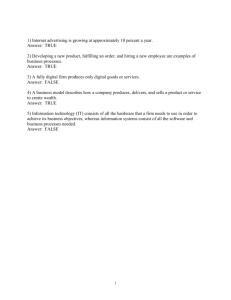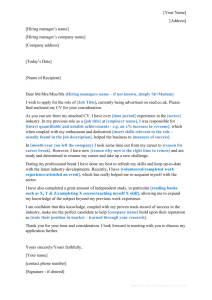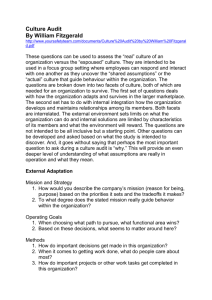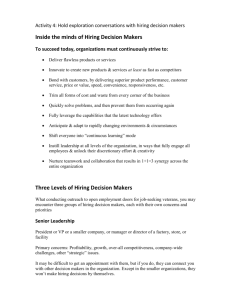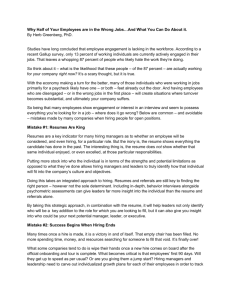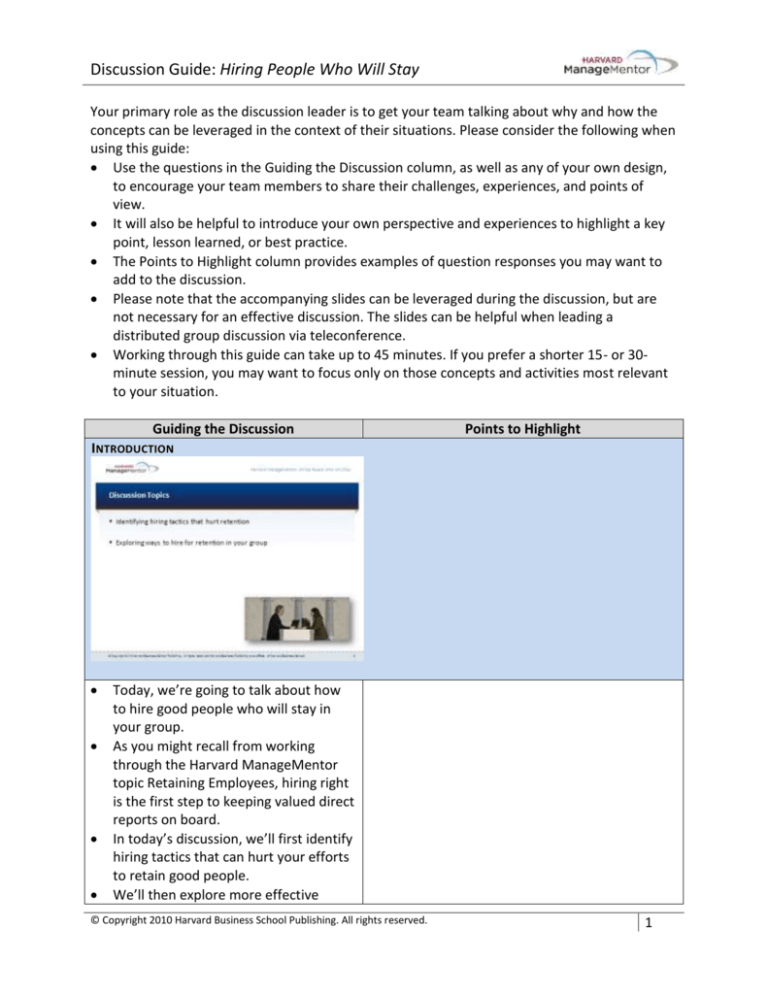
Discussion Guide: Hiring People Who Will Stay
Your primary role as the discussion leader is to get your team talking about why and how the
concepts can be leveraged in the context of their situations. Please consider the following when
using this guide:
Use the questions in the Guiding the Discussion column, as well as any of your own design,
to encourage your team members to share their challenges, experiences, and points of
view.
It will also be helpful to introduce your own perspective and experiences to highlight a key
point, lesson learned, or best practice.
The Points to Highlight column provides examples of question responses you may want to
add to the discussion.
Please note that the accompanying slides can be leveraged during the discussion, but are
not necessary for an effective discussion. The slides can be helpful when leading a
distributed group discussion via teleconference.
Working through this guide can take up to 45 minutes. If you prefer a shorter 15- or 30minute session, you may want to focus only on those concepts and activities most relevant
to your situation.
Guiding the Discussion
Points to Highlight
INTRODUCTION
Today, we’re going to talk about how
to hire good people who will stay in
your group.
As you might recall from working
through the Harvard ManageMentor
topic Retaining Employees, hiring right
is the first step to keeping valued direct
reports on board.
In today’s discussion, we’ll first identify
hiring tactics that can hurt your efforts
to retain good people.
We’ll then explore more effective
© Copyright 2010 Harvard Business School Publishing. All rights reserved.
1
Discussion Guide: Hiring People Who Will Stay
Guiding the Discussion
hiring practices that can help you keep
good people on board.
Points to Highlight
Note: If your team has only a few
individuals who have their own direct
reports, you may have decided to partner
with a colleague to co-lead this discussion
for your combined teams. If so, explain the
situation and thank your colleague and his
or her team members for being part of the
discussion.
HIRING PRACTICES THAT HURT RETENTION (20 MINUTES)
Let’s start by talking about hiring
practices we’ve used that can prevent
us from keeping good people on board.
As you saw in the Harvard
ManageMentor topic, there are several
hiring practices that can hurt retention.
So let’s spend some time talking about
our experiences.
What hiring practices have not been
effective in attracting good people who
stay on board? If you don’t have your
own examples to share, what practices
do you think would be ineffective for
any manager?
Note: Share stories or examples from your
own experiences in hiring, to help stimulate
discussion. If you’re co-leading the discussion
with a colleague, encourage him or her to do
the same.
Note: Also consider citing examples of
ineffective hiring practices covered in the
Harvard ManageMentor topic — such as
hiring for skills, not interests; hiring for
macroculture, not microculture; seeking the
© Copyright 2010 Harvard Business School Publishing. All rights reserved.
2
Discussion Guide: Hiring People Who Will Stay
Guiding the Discussion
Points to Highlight
“hottest” prospects instead of the most
appreciative ones; and hiring in your own
image instead of for diversity.
Note: Ask discussion participants not to reveal
names of specific employees mentioned in
their stories or examples.
Example responses:
o I hired someone specifically because
she had all the right skills for the job.
But a few months after her first day,
she gave her notice. She said she
wasn’t really excited by the work. I
guess I was so focused on skills that I
didn’t think about whether she was
interested in the job in the first place!
o I think that if a manager brought in a
new hire who seemed to be a good fit
with the company’s overall culture, it
could backfire. The manager’s team or
department might have a totally
different culture, and the person might
not fit into it at all.
o I was so excited when I managed to
convince this top-notch candidate to
take the job. He came from the best
school, and a lot of other companies
were trying to snag him. But since he
started the job, he just doesn’t seem to
appreciate our team and what we’re
trying to do. I keep getting the feeling
that his heart isn’t in the job and that
he’s thinking about leaving.
o I used to work in a department where
our manager kept bringing in people
who were just like her — same
personality, same work style. The
group seemed to be operating with
just “one mind,” and we never seemed
to be able to do any really creative
work. I finally got so frustrated that I
left. It might be hard to hire people
who aren’t like you at all, but I think
© Copyright 2010 Harvard Business School Publishing. All rights reserved.
3
Discussion Guide: Hiring People Who Will Stay
Guiding the Discussion
Points to Highlight
it’s a good idea to try.
IDEAS FOR HIRING PEOPLE WHO WILL STAY (20 MINUTES)
We’ve talked about the kinds of hiring
practices that haven’t helped us keep
good people on board or that could be
ineffective for any manager seeking to
improve retention.
Now let’s talk about what we could do
instead to hire specifically with
retention in mind.
Who’d like to share thoughts based on
your experience about how to hire
people who are likely to stay?
Your ideas could include what you
might do in your own group to hire for
retention, or approaches that could be
helpful for any manager or team
leader.
Note: Share a story or ideas you have about
hiring for retention in your own team. If you’re
co-leading the discussion with a colleague,
encourage him or her to do the same.
Note: Consider citing some examples of more
effective practices covered in the Harvard
ManageMentor topic Retaining Employees —
such as hiring for interests, not just skills;
hiring for microculture, not macroculture;
seeking prospects who will be grateful for the
job; and hiring people for diversity in
personality and work style instead of hiring
people in your own image.
Example responses:
o In addition to asking people about
their skills during interviews, I’d like to
start asking them about their business
interests. I’m thinking about adding
© Copyright 2010 Harvard Business School Publishing. All rights reserved.
4
Discussion Guide: Hiring People Who Will Stay
Guiding the Discussion
Points to Highlight
interview questions like “What did you
like doing most in other jobs?” and
“What do you enjoy doing in your
spare time?”
o It would be good for any manager to
walk a job interviewee around the
department and introduce them to
some of the people who work there.
That way, the person could get a sense
of the department’s culture before
deciding if the job could be a good fit.
o During interviews, I’m also going to
spend some time explaining what’s
great about working for our team.
Then I’ll look for signs of interest and
excitement in the person. I want to do
this regardless of whether the person
I’m interviewing is a “hot” prospect or
someone with more modest
credentials.
o I think hiring managers should do an
inventory of the personalities and work
styles in their team. Then, when they
interview job candidates, they should
ask questions that get at what the
person is like on the job. The manager
can then think through whether that
person would help add to the diversity
in the team.
© Copyright 2010 Harvard Business School Publishing. All rights reserved.
5
Discussion Guide: Hiring People Who Will Stay
Guiding the Discussion
Points to Highlight
NEXT STEPS
Take a moment to consider some of the
things you might do as a result of our
discussion today. For example:
The next time you interview someone
for possible hire into your team, apply
the ideas we’ve talked about today for
hiring for retention.
Pair up with a colleague who also has
direct reports, and discuss additional
ideas for hiring for retention.
Complete the Work Culture Survey
provided in the Harvard
ManageMentor topic, to assess your
group’s microculture.
© Copyright 2010 Harvard Business School Publishing. All rights reserved.
6

